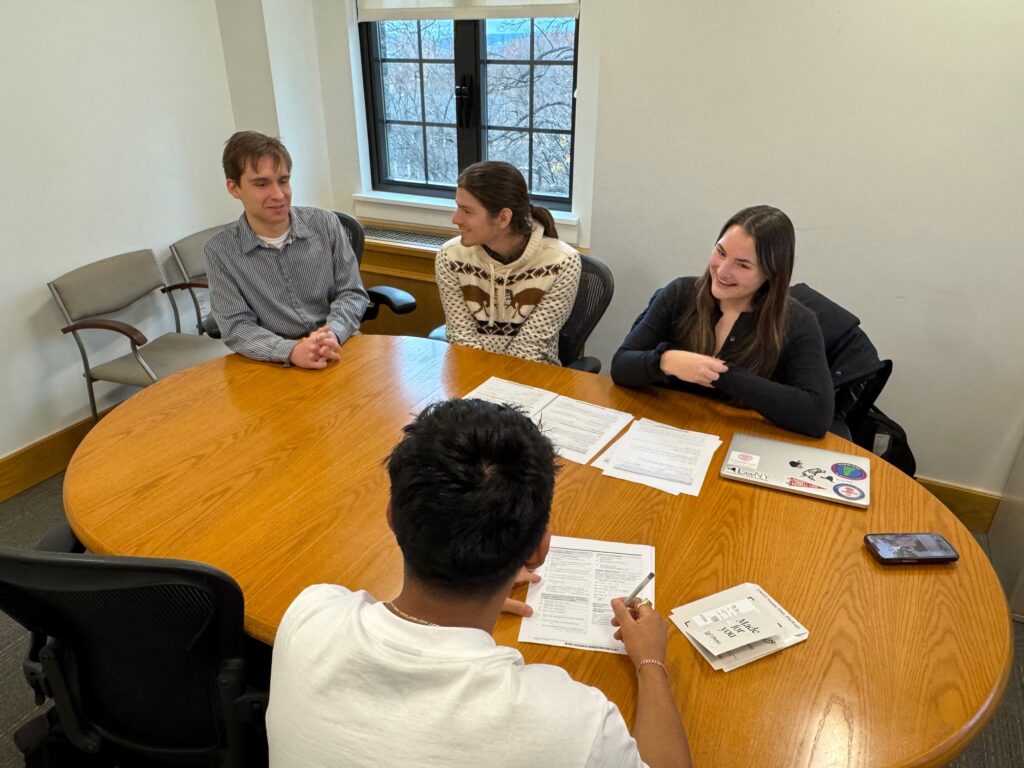This website uses cookies
We use cookies to ensure that we give you the best experience on our website. If you continue to use this site we will assume that you are happy with it.

From left: Joe Shepard ’27, Davis Postell ’26, and Paige Osgood ’26 with their client, Jaime.
This fall, a federal immigration raid at an upstate New York factory prompted a swift response from Cornell Law School’s clinical programs. Among those detained by Immigration and Customs Enforcement (ICE) was Jaime (name changed), a legally authorized worker and long-time client of the Farmworker Legal Assistance Clinic. Despite holding a valid work permit and being just weeks away from applying for a green card, he was held in federal custody for nearly two months before Cornell Law students and faculty secured his release.
Jaime had been lawfully progressing toward permanent residency through Special Immigrant Juvenile Status (SIJS), a designation for individuals under twenty-five who have been abandoned, abused, or neglected by their parents. He received SIJS nearly five years ago after being abandoned by his father and mistreated by his grandparents. His abrupt arrest and transfer to a detention facility in Texas disrupted his nearly completed green card application process.
Within hours of learning of the raid, Cornell Law faculty and students began working to locate Jaime. For several days, he was held at an undisclosed location, and counsel only learned his whereabouts after he managed to call from a Customs and Border Protection facility in Texas. Over the next two months, the clinical team dedicated hundreds of hours to emergency filings, coordination with officials, and advocacy to ensure Jaime’s access to counsel and the medical evaluation required for his application — efforts that ultimately led to his release.
In detention, Jaime reported inhumane conditions — including inadequate food, cramped living spaces, no access to a bed for days, knife cuts on his arms owing to guards’ carelessness in taking off his restraints, and restricted access to his lawyers. Numerous law faculty and students, led by Sahil Venkatesan ’27, worked nonstop with local counsel in Texas to research and draft a habeas petition and temporary restraining order. The habeas materials developed by Venkatesan can now be used as templates in case of future client detentions.
Meanwhile, in immigration court, the case team — Farmworker Clinic Immigrant Justice Corps Fellow Tasha Gottschalk-Fielding ’23 and Farmworker Clinic students Davis Postell ’26, Paige Osgood ’26, and Joe Shepard ’27 — navigated repeated barriers just to speak with their client amid urgent time constraints to prevent deportation. They worked through five emergency hearings, four motions, a substantial filing for relief, and near-daily communication with Jaime and his family. In a late-October hearing, Osgood’s oral argument persuaded an initially skeptical immigration judge to terminate the proceedings. Within a week, Jaime was reunited with his family.
In the hearing, the judge criticized the government for wasting taxpayer dollars by detaining Jaime and preventing him from pursuing his green card application despite his clean record, Special Immigrant Juvenile Status, and valid federal work authorization. The ruling cleared the way for his release and allowed him to resume the immigration process that had been underway for years.
Gottschalk-Fielding noted, “This case was truly a team effort. This outcome would not have been possible without the tireless efforts of students and faculty throughout the clinical programs, the support of colleagues across multiple states, and Jaime’s continuing strength and resilience in fighting for his future.”
“I could not be prouder of our students, faculty, and staff for their dedication and excellence,” said Clinical Professor Beth Lyon, director of the Farmworker Legal Assistance Clinic and associate dean for experiential education. “This case shows how Cornell Law’s clinical and experiential learning programs prepare students to respond to urgent legal needs in real time.”
For Cornell Law students, the case became an intensive, real-time immersion in the human consequences of immigration enforcement that disregards the rule of law. “Our priority was ensuring Jaime’s rights were protected and that he wasn’t left to navigate this alone,” said Osgood. “This case has been the most challenging and rewarding part of my law school journey. I’ve learned an incredible amount through the process and am so grateful that it’s led to Jaime’s safe return to Upstate New York, where we’re now working to file his green card application.”
Shepard noted, “I was very new to the Farmworker Clinic when I became involved with this case, so it was a great learning experience for me. I am so glad that Jaime is now back in New York and on a path towards citizenship.”
Advocates say Jaime’s experience is part of a broader trend in which legally authorized immigrants — or those with pending applications — are increasingly swept up in large-scale enforcement actions. Federal agencies have not commented on the circumstances of his arrest or the conditions he described in detention.
Jaime is now focused on regaining stability and continuing the immigration process he had lawfully pursued before the raid.